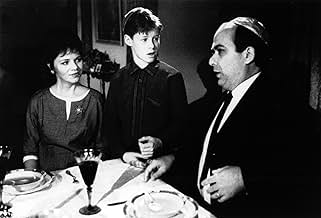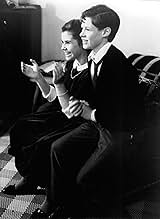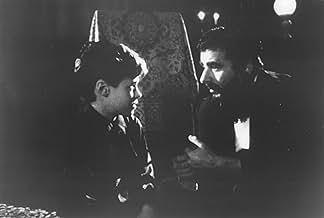Aggiungi una trama nella tua linguaA young Jewish adolescent from an overbearing family likes a Christian girl and is helped by a fun-loving rabbi.A young Jewish adolescent from an overbearing family likes a Christian girl and is helped by a fun-loving rabbi.A young Jewish adolescent from an overbearing family likes a Christian girl and is helped by a fun-loving rabbi.
- Premi
- 2 vittorie e 5 candidature totali
Recensioni in evidenza
The key conflict is how his, and the young rabbi's, sense of identity, both self and ethnic runs counter to the older generation's perception of those issues. To the older generation, being Jewish means to remain invisible, as if to be ashamed of what they are. Any one deviating from that is shut out and feared. Max and the young rabbi on the other hand, represent a new generation with a real sense of security in their religion and a willingness to share it with outsiders.
The example is shown most distinctly in how the generations celebrate. The old one's are sombre and quiet affairs that are from the outsiders, whereas the younger ones dance and play with an infectious joy that teach those same outsiders the beauty of Jewish culture and do more to help Jewish people than the fear the elders have.
Only when the older generation realizes this, is a peace made when they learn that you can protect your way of life by sharing far more than you can by shutting out.
To have a message as profound as this in a film with all the laughs and beauty is a rarity that you owe it yourself to see.
It has a nice charming coming-of-age story. The characters are endearing with some terrific actors. It's a small town Jewish kid trying to deal with both religion and love at the same time. The production is strictly old-timey Canadiana. It's not high value but even that has a certain charm. The kid is good and Saul Rubinek is terrific. The lower production value limits its cinematic appeal but the material is first rate.
On one level, it is a poignant, funny, warmhearted, intelligent exploration of the tensions inherent in being a stranger in a strange land, in this case, being Jewish in a prairie town in Canada. The leaders of the Jewish community (with good reason) don't feel they have been welcomed by the dominant community of non-Jews in the town, and they struggle to maintain their cultural uniqueness while endeavoring to avoid being seen as "different." But these desires inherently conflict, and they come to the surface via the interactions of the community, the 12-year-old protagonist (a boy who is the movie's truth-teller), his Christian friend and incipient girlfriend (who is also his two-hands piano partner), and a Lubovitcher Hasidic rabbi, who offers wisdom that excites the boy's mind and heart while conflicting with the community's wishes. The story looks unblinkingly at both the nontrivial weaknesses and enormous strengths of Jewish culture, yet could just as well have been about Vietnamese in America, Pakistanis in England or Greeks in Australia.
On another level, it is about the struggle to be true to one's individual nature, as opposed to what society expects of us. The boy has to confront the question "Does honoring your parents always mean complying with their wishes." The rabbi faces the question of how he wants to fulfill his life's mission.
These are serious questions, handled with a deft, light touch, in a script with just the right amount of warmth and wit, in a place that is somehow both familiar and strange, far from the usual Hollywood sets. Oh yes, and the klezmir music is wonderful!
Clearly a 10.
Lo sapevi?
- QuizMany interior scenes were filmed in an abandoned apartment building at 351 Victor Street in Winnipeg. The building had been condemned by the city earlier in 1987, and had no running water or heat when the film crew starting using it a few months later. Eight indoor sets were constructed with 1960s decor, including Rabbi Teitelman's apartment, and the Glick house. After the film's production was complete, the city finished renovating the building for low cost housing.
- Citazioni
Rabbi Teitelman: [speaking at a Brotherhood Day gathering] Now, Cohen got a telegram from his son. 'Papa, I'm going to Jerusalem. I'm going to become a Christian.' Oy, vey, he didn't know what to do. He ran to Greenberg, he told him the whole story. Greenberg said, 'It's funny you should mention. I got a telephone call from my son, he said he's going to Jerusalem, he's gonna become a Christian'. What to do? They went to run to the rabbi, they told him the whole sad story. The rabbi said, 'Funny you should mention. My son's going to Jerusalem, he's going to become a Christian, and I'm a rabbi. You can imagine how ashamed I am. What should we do? We have to pray to the Creator, we have to rend our clothes, we have to put ashes on our head, fast for two days.' Two days later, the gates of Heaven opened. The voice of the Creator came down and said, 'My children, what can I do for you?' And each man told him that his son was going to Jerusalem to become a Christian. And then, the voice of the Creator boomed out, 'Funny you should mention... '
- ConnessioniFollowed by Max Glick (1990)
- Colonne sonoreHoben Mir A Niggundal
Arranged & Performed by Finjan
I più visti
Dettagli
- Data di uscita
- Paese di origine
- Lingua
- Celebre anche come
- The Outside Chance of Maximilian Glick
- Luoghi delle riprese
- Aziende produttrici
- Vedi altri crediti dell’azienda su IMDbPro
Botteghino
- Lordo Stati Uniti e Canada
- 317.670 USD
Contribuisci a questa pagina



























